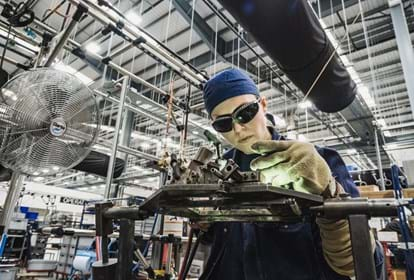UK innovators with cutting edge projects to drive growth across manufacturing industries have been funded by the Made Smarter Innovation Challenge.
UKRI’s Made Smarter Innovation (MSI) Challenge, delivered by Innovate UK, the Engineering and Physical Sciences Research Council, and the Economic and Social Research Council, has awarded grants to 11 late-stage robotics and automation projects with a focus on developing solutions to improve productivity, sustainability, and resilience within factory production areas.
In total, 11 projects spanning areas such as process control, machine vision, and deployment in end gripper technology, secured between £107,000 and £535,000 in funding. Each project will last 9 to 15 months and will be tested across sectors including food and drink, electronics and fast-moving consumer goods.
In-factory demonstrations
The funding opportunity required each project to deploy an in-factory demonstration to test operation in real-life conditions. The technology development partners will then use the learnings from across the cohort of projects to further develop commercial solutions.
The winning projects comprised 30 organisations:
- Small and medium-sized enterprises
- Large manufacturers
- Technology developers
- Research and technology organisations.
Ten of the projects contained partners from across two or more regions of the UK.
Funded Projects included:
Rivelin Robotics: Project CAMPFIRE
Rivelin is advancing metal post-processing for additive manufacturing (AM) with 3D vision and force control algorithms. Collaborating with GKN Aerospace and others, the project aims to automate finishing for flight parts, orthopaedic implants, and gas turbine components. Success could revolutionise tightly regulated industries, unlocking growth and investments in automation, impacting sectors such as aerospace, medical, and energy, as well as civil aerospace, defence, and automotive industries.
Robert Bush, CEO Rivelin Robotics said, "The support from Innovate UK has been pivotal in accelerating Rivelin Robotics' journey. The funding not only catalyses the development of our innovative platform, but also empowers us to tackle complex challenges in additive manufacturing. This grant is a key enabler in our mission to revolutionise robotic finishing of near-net-shape parts, enhancing the UK's position in advanced manufacturing."
Brompton Bicycle: Project BROM-BOT
BROM-BOT aims to optimise bicycle production at Brompton's Greenford site through the development and demonstration of industrial-grade robotic and automation solutions. The project involves creating a 'robot sandpit/playground' and leveraging East Kent College’s robotic learning factory in Canterbury to test integration across key operations within the factory. The goal is to identify operations and upskill its current workforce with the potential to significantly enhance productivity, quality, scale, safety and sustainability.
Phill Elston, Operations Director at Brompton Bicycle said: “This new funding will enable the team to drive forward an array of exciting technology projects, ultimately meaning that Brompton can continue to be a leader of innovation in the urban mobility industry.”
Flamingo Flowers: Project FLORABOT
Project FLORABOT develops digital and automation technologies for flower packing factories to overcome the industry's reliance on seasonal migrant labour from the EU. The project looks to maximise production efficiency and develop flexible automation solutions for bouquet-making operations.
Martyn Shannon, Operations General Manager, Flamingo Flowers said: “This competition is a real opportunity to help us advance our automation and robotics development programme. Our partnership with the Manufacturing Technology Centre, part of the High Value Manufacturing Catapult, allows us to utilise key expertise in automation, robotics and vision systems and keep Flamingo Flowers at the forefront of innovation.”
Innovative digital solutions
The MSI Challenge helps take the risk out of innovation for UK manufacturers who want to make change happen, supporting collaborations between UK manufacturing sectors to create innovative digital solutions, with the help of leading industry experts in digital technologies.
Chris Needham, Innovation Lead in the MSI Challenge said: “The successful 11 projects have the potential to improve process automation and efficiency in environments where those kinds of gains are hard to come by. The importance of these kinds of innovations for the UK economy can’t be overstated. Our funding is designed to support them as they pave the way to a smarter and more resilient manufacturing landscape."
Find out more about MSI at https://www.ukri.org/what-we-do/browse-our-areas-of-investment-and-support/made-smarter-innovation/


